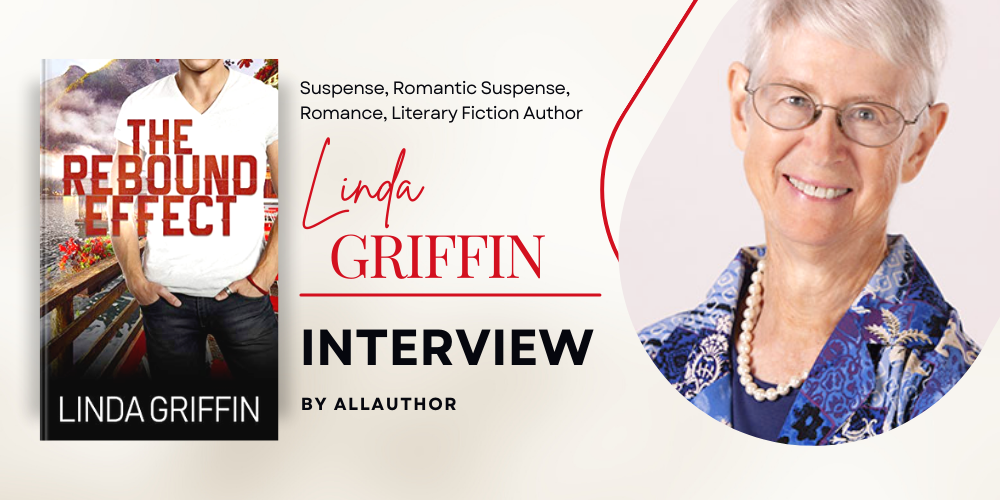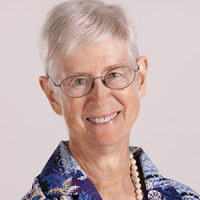Linda Griffin Interview Published on: 29, Jul 2022
 How did you start your writing career?
How did you start your writing career?
I learned to read. As soon as I figured out that someone had to create the words I was reading, I knew I wanted to be a “book maker” when I grew up. I borrowed the basic plot from a Little Lulu comic book to create my first story, “Judy and the Fairies,” when I was six.
Do you think earning a BA in English has helped you in your writing career?Yes, in the sense that it broadened my literary knowledge and taste. I also had my first published story in the campus literary magazine at SDSU.
Do you remember the first story you ever read and the impact it had on you?I’ll never forget it! I believe the title was Fun with Dick and Jane, the elementary school reader. It ignited my passion for the written word, and I dedicated The Rebound Effect to Dick and Jane. I loved it (or the joy of reading) so much that I read it aloud to everyone in the house, including two captive kittens, one under each arm, and then I read it backwards!
How did you find the motivation to write your first book?I had been writing stories for many years when I wrote my first book-length work, Trace and Margie: A Novel of the 1860s. when I was sixteen. It was 87,000 handwritten words, some of it in pencil, and heavily influenced by TV westerns. Motivation wasn’t a problem—you couldn’t stop me!
What challenges did you face while publishing your novel, The Rebound Effect?It was actually one of the best experiences of my life. It was my second novel with the Wild Rose Press, so I already had a relationship with my editor. There was an element in the story that was not acceptable to the publisher but essential to the story, which had led to it being rejected the first time I submitted it. After Seventeen Days was published, my wonderful editor Nan Swanson agreed to take another look at it, and we worked together to tame it a bit and ultimately make the story even better. I also very much enjoyed the back and forth we had coming up with the title after the first one proved to have been already used by the Wild Rose Press. It’s still my favorite of my published novels, and my favorite title.
How much time do you spend researching when writing romantic suspense?It depends on the story, of course. I was a reference librarian and have always enjoyed research, so it’s never a chore. I try to get the details as accurate as possible, and the further it is from my own experience, the more challenging—and fun—it is.
What is better for you: starting a book or finishing it?Finishing is satisfying, but nothing beats the excitement when a spark ignites a vague idea and the words begin to flow.
What is your writing schedule?I would love to have a reasonable schedule, preferably in the morning, when my creative energy is highest, but I’ve always had to write on my characters’ schedule, not my own. When they have something to say, I have to take dictation as fast as I can, and unfortunately it is often during the night. I keep a notebook and pen by my bed for the purpose.
What is more difficult, writing a series or writing a standalone?I’ve never written a series, and doubt that I ever will. I’d love to see Guilty Knowledge as a TV series, but I wouldn’t be the one to come up with the new storylines. I did write one sequel, to my first published novel, Stonebridge, because it was the only way to stop myself from continuously rewriting the ending. Those characters stayed with me more than any others.
What's your best social media marketing tip?It’s definitely a crap shoot, so I think the best thing is to do what you most enjoy. I think readers are more likely to respond when you’re engaged. I prefer Twitter, with its supportive writing community and the fun hashtag games like #thurds, #BookQW, #FridayKiss, etc. I’ve used Facebook ads, but Twitter is more user friendly. I like posting on Instagram too.
How do you make sure to draw young readers into your stories?My stories aren’t written for young readers, except possibly Bridges, which has an 18-year-old heroine.
Is the ability to write considered rare?I don’t think so. Doesn’t everybody think they can write?
What are some aspirations you have for your future as an author?I’m pretty much taking it as it comes.
What are your plans for the future as a writer? Are you working on anything new?At the moment I’m working on three shorter romance stories that could be published separately or as a collection.
How has your experience of being associated with AllAuthor been?I’ve found the Magic Tool, seasonal banners, and GIF maker very easy to use. Some of the images are quite beautiful, and I especially liked using the ones with books for Bridges, which is about two book lovers. The regular tweets by AllAuthor are much appreciated too.
Share Linda Griffin's interview
Born and raised in San Diego, California, Linda Griffin retired from a position as a fiction librarian for the San Diego Public Library. She has been writing stories for many years. Her earliest ambition was to be a “bookmaker” and she wrote her first story, “Judy and the Fairies" at the age of six. She enjoys reading, writing, and research.










